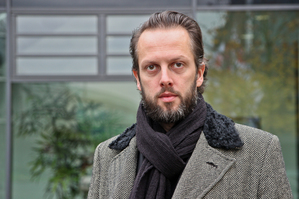Prof. Dr. Laurent de Sutter
Vrije Universiteit Brussel
Curriculum Vitae
Laurent de Sutter studierte Rechtswissenschaften an den Facultés Universitaires Saint-Louis (Brüssel) sowie an der Université Catholique de Louvain. 2001 erwarb er einen Masterabschluss in Rechtstheorie an der European Academy of Legal Theory in Brüssel und 2002 das D.E.A. in Rechtssoziologie an der Université Paris II Panthéon-Assas. 2006 wurde er mit seiner Dissertation „Politiques de la représentation“ an der Vrije Universiteit Brussel promoviert, wo er seit 2002 als Junior Researcher beschäftigt war und seit 2006 als Senior Researcher arbeitet. Für seine Forschung erhielt er zahlreiche Stipendien, unter anderem vom Fonds Wetenschappelijk Onderzoek - Vlaanderen (FWO). Von 2010 bis 2013 lehrte Laurent de Sutter Rechtstheorie an den Facultés Universitaires Saint-Louis in Brüssel. Zudem war er 2011 Visiting Honorary Research Fellow an der Benjamin N. Cardozo School of Law, New York. Seit 2012 ist er Professor für Rechtstheorie an der Vrije Universiteit Brussel. Außerdem ist Professor de Sutter geschäftsführender Herausgeber (Managing Editor) der Schriftenreihen “Perspectives Critiques” (Presses Universitaires de France) und „Theory Redux“ (Polity Press), gehört zu den Herausgebern der Zeitschriften „Décalages: An Althusser Studies Journal“ und „Law & Literature“ und ist Mitglied des wissenschaftlichen Rates des Collège International de Philosophie (Paris). Von Oktober 2014 bis September 2015 war Laurent de Sutter Fellow am Käte Hamburger Kolleg „Recht als Kultur“.
Research Project
The Poetics of Police
The purpose of the present project is to provide room for the very first research ever attempted on the critical comparison of the cultural concept of police, as it may be observed at work in the Civil (France), Common (United States) and Confucian (China, Japan) legal traditions. If the field of Police Studies has been blossoming in the recent years, its core object has remained strictly institutional: the analysis (critical or not) of the institutional functioning and practice of the police as a body. But there is more to police than a mere body: there is an idea reflecting the type of legal system that it aims to enforce, and, beyond legal dispositions, the culture from which this system is the legal expression. It is the goal of this project to try to understand what the concept of police means in three different legal cultures, and how this meaning manifests not only the actual contents, but also the very structure of these cultures and their respective mode of thought. In order to do so, a specific tool will be used: a substantial corpus of movies, shot between 1960 and today, and belonging to the three traditions on which the present project will be focusing. The epistemological hypothesis behind the choice of a medium of artistic expression in the task of trying to understand a cultural-legal phenomenon is that, through this medium, the common, Police Studies understanding of what police is might give room to a more refined, more sophisticated one. Films never simply are mere illustration of a state of affairs: beyond their explicit message they embody a latent expression of the cultural truth underlying this state of affairs – be it legal, political, or aesthetical. And this truth is the truth of what Jacques Rancière calls ‘the distribution of sensible’: the violence of the division of space and of the attribution of places in a given society – and what this violence excludes from it. It is the representation of the role of police as performing these divisions and this process of attribution that the present project aims at exploring through the media of film.
Selected Publications
- Après la loi (“After Law”), Paris: PUF, “Perspectives Critique” series (Hg. von Laurent de Sutter), im Erscheinen.
- Zizek & Law (Hg.), London: Routledge, “Nomikoi: Critical Legal Thinkers” series (Hg. von Peter Goodrich und David Seymour), 2015.
- Métaphysique de la putain (“Metaphysics of the Whore”), Paris: Léo Scheer, “Variations” series (Hg. von Léo Scheer) 2014.
- Théorie du trou. Cinq médiations métaphysiques sur “Une sale histoire” de Jean Eustache (“Theory of the Hole: Five Metaphysical Meditations on Jean Eustache’s ‘Une sale histoire’”), Paris: Léo Scheer, “Variations” series (Hg. von Léo Scheer) 2013.
- Althusser & Law (Hg.), London: Routledge, “Nomikoi: Critical Legal Thinkers” series (Hg. von Peter Goodrich und David Seymour) 2013.
- Contre l’érotisme (“Against Eroticism”), Paris: La Musardine, “L’attrape-corps” series (Hg. von Sarah Chiche) 2011.
- Deleuze. La pratique du droit (“Deleuze. The Practice of Law”), Paris: Michalon, “Le bien commune” series (Hg. von Antoine Garapon) 2009 (Italienische Übersetzung: Deleuze e la pratica del diritto, Verona: Ombre Corte 2011; brasilianische und englische Übersetzungen in Vorbereitung).
- De l'indifférence à la politique (“On the Indifference to Politics”), Paris, PUF, “Perspectives Critiques” (Hg. von Roland Jaccard) 2008.
- Pornostars. Fragments d’une métaphysique du X (“Pornstars. Fragments of a Metaphysics of X-Rated Movies”), Paris: La Musardine, “L’attrape-corps” series (Hg. von Serge Koster) 2007.


